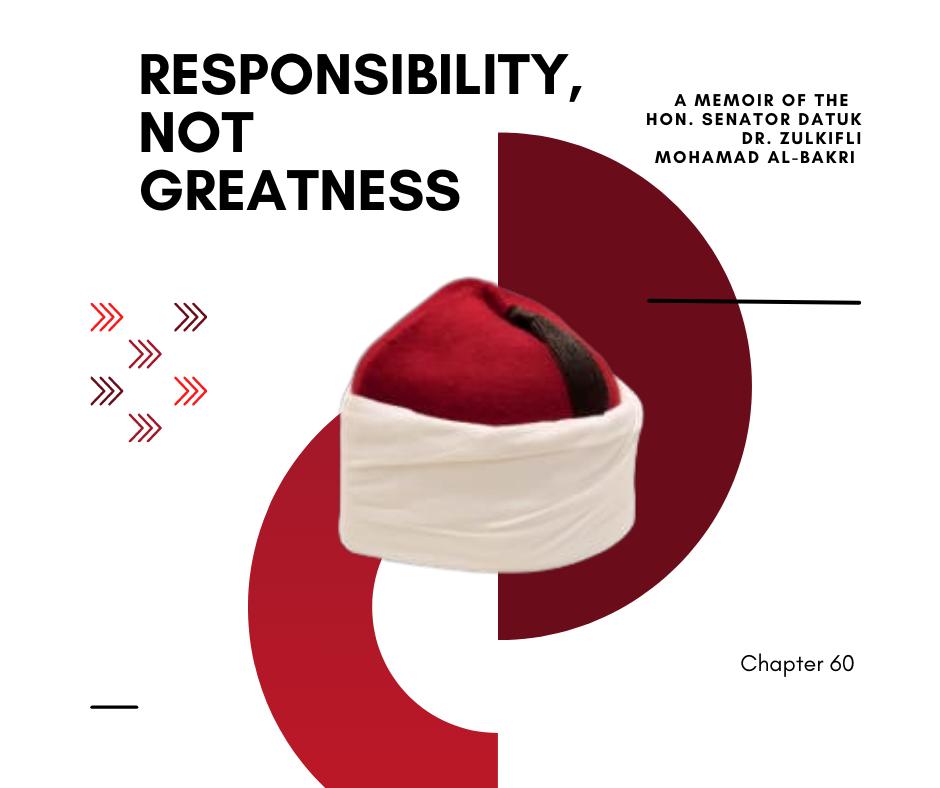Memoir Eng
Chapter 60: Responsibility, Not Greatness
Prologue II
Alhamdulillah, the first volume which is the compilation of 59 chapters of my memoir beginning from my birth until I completed my service in USIM is finished. Readers can access it in both Malay here and in English here.
The second volume will focus more on my experiences throughout my appointment as the Mufti of Federal Territories. There are various happy and sad memories during my tenure as the Mufti that I’ll share in this volume. Some are public knowledge and some are not. Reminiscing back, sometimes I’ll smile to myself. Sometimes it makes tears well up in my eyes. What’s for certain, I’ll share my 7 years of experience in the world of fatwa and fatwa management in-depth for the benefit of all.
Thank you all for your support!
***************************
“I received a call offering me a great responsibility. What’s your take on it?” Zulkifli asked Hashim, one of his assistants. Zulkifli carefully detailed one by one, several of his meetings with the Minister in the Prime Minister’s Department, Major General (B) Dato’ Seri Jamil Khir bin Baharom, who relayed the decision of the Federal Government to appoint him as the Mufti of the Federal Territories. The position has yet to be filled after Sahibus Samahah Datuk Wan Zahidi Wan Teh, the 6th Mufti of the Federal Territories contract ended.
“The last time I met YB Minister was at Tuanku Mizan Mosque in Putrajaya. Well, whatever will be, please keep this to yourself…” Zulkifli said. His face is serious and slightly red. “I think you should also consult your family,” Wajdi interjected, offering his opinion. Zulkifli nodded in agreement.
Hashim and Wajdi turned and looked at each other. Both of his assistants are speechless. Usually, Zulkili would always ask for his assistants’ input before deciding on any matter, from the smallest of issue. This time though, both of them are dumbfounded.
He never asked for the position. Especially when the action of asking for the position is strictly prohibited by Rasullullah PBUH.
إِنَّكُمْ سَتَحْرِصُونَ عَلَى الْإِمَارَةِ، وَسَتَكُونُ نَدَامَةً يَوْمَ الْقِيَامَةِ، فَنِعْمَ الْمُرْضِعَةُ وَبِئْسَتِ الْفَاطِمَةُ
“You will be eager for the office of commander, but it will become a cause of regret on the day of resurrection. It is a good suckler but an evil weaner.”
This hadith explains the warning against those who ask for a position. If a person asks for a position, he’ll receive what he asked for but without the help (from Allah SWT) in fulfilling his work. It is concluded that the ruling related to power such as governance, administration and whatever related to it is makruh (discouraged). [4]
However, the restriction is not an absolute prohibition against asking for apposition. Consequently, it serves as a reminder of the dangers of responsibility and trust without any preparation or just for worldly benefits. Furthermore, for an individual who has the strength and competency for the responsibility is permissible to ask for the position. This could be seen in the story of the Prophet Joseph (Yusuf) AS who asked to be the minister in Egypt. Allah SWT states:
قَالَ اجْعَلْنِي عَلَىٰ خَزَائِنِ الْأَرْضِ ۖ إِنِّي حَفِيظٌ عَلِيمٌ
“[Joseph] said, “Appoint me over the storehouses of the land. Indeed, I will be a knowing guardian.” [5]
Zulkifli once read an opinion of this teacher, Syeikh Dr Wahbah al-Zuhaili who explained that this verse is a response of the hadith that restricts the Muslim ummah against asking for a position and the ethics of doing so if one wants a position. What can be concluded from the hadith which restricts asking for a position and the above verse of the Quran are:
- An individual who doesn’t have the character of a leader such as weak, old or selfish, then it is prohibited for him to ask for a position or authority for his incompetence.
- It is permissible for a person to ask for a position and show his preparedness if the purpose is a self-introduction.
- A person who asks for a position must possess the following characteristics such as trustworthiness, comprehensive religious knowledge and competency in management.
- It is also permissible for a scholar to work under a fasiq or a king who isn’t a Muslim if there is no other way to uphold the truth. However, if the opinion and decision of the scholar permit their desires and wishes, then it is impermissible.
- A person can promote himself in regards to his knowledge, greatness and capabilities depending on the situation; such as in job application and other similar situations.
- Communication amongst people is crucial in getting to know each other, hence, a person who wishes to get the position must also be eloquent in communication. [6]
************************
Sunnah istikharah prayer and supplication became Zul’s companion every night. Zulkifli has yet to make a decision. Regarding sunnah istikharah prayer, it is among the sunnah the Prophet PBUH taught us. This is based on a narration from Jabir bin Abdullah:
كَانَ رَسُولُ اللهِ صَلَّى اللَّهُ عَلَيْهِ وَسَلَّمَ يُعَلِّمُنَا الاِسْتِخَارَةَ فِي الأُمُورِ كُلِّهَا كَمَا يُعَلِّمُنَا السُّورَةَ مِنَ القُرْآنِ ، يَقُولُ : إِذَا هَمَّ أَحَدُكُمْ بِالأَمْرِ فَلْيَرْكَعْ رَكْعَتَيْنِ مِنْ غَيْرِ الفَرِيضَةِ ، ثُمَّ لِيَقُلْ : اللَّهُمَّ إِنِّي أَسْتَخِيرُكَ بِعِلْمِكَ ، وَأَسْتَقْدِرُكَ بِقُدْرَتِكَ ، وَأَسْأَلُكَ مِنْ فَضْلِكَ العَظِيمِ ، فَإِنَّكَ تَقْدِرُ وَلاَ أَقْدِرُ ، وَتَعْلَمُ وَلاَ أَعْلَمُ ، وَأَنْتَ عَلاَّمُ الغُيُوبِ ، اللَّهُمَّ إِنْ كُنْتَ تَعْلَمُ أَنَّ هَذَا الأَمْرَ خَيْرٌ لِي فِي دِينِي وَمَعِيشَتِي وَعَاقِبَةِ أَمْرِي ، أَوْ قَالَ : فِي عَاجِلِ أَمْرِي وَآجِلِهِ ، فَيَسِّرْهُ لِي ، ثُمَّ بَارِكْ لِي فِيهِ ، وَإِنْ كُنْتَ تَعْلَمُ أَنَّ هَذَا الأَمْرَ شَرٌّ لِي فِي دِينِي وَمَعِيشَتِي وَعَاقِبَةِ أَمْرِي ، أَوْ قَالَ : فِي عَاجِلِ أَمْرِي وَآجِلِهِ ، فَاصْرِفْهُ عَنِّي ، وَاصْرِفْنِي عَنْهُ ، وَاقْدُرْ لِي الخَيْرَ حَيْثُ كَانَ ، ثُمَّ أَرْضِنِي بِهِ ، قَالَ : وَيُسَمِّي حَاجَتَهُ.
“Allah’s Messenger would teach us Al-Isthikhara for all of our affairs just as he would teach us a Surah of the Qur’an, saying: ‘When one of you is worried about a matter, then let him perform two Rak’ah other than the obligatory (prayer), then let him say: “O Allah! I consult Your knowledge, and seek ability from Your power, and I ask You from Your magnificent bounty, for indeed You have power and I do not have power, and You know while I do not know, and You know the unseen. O Allah! If you know that this matter is good for me in my religion or my livelihood, and for my life in the Hereafter – or he said: for my present and future – then make it easy for me, then bless me in it. If You know that this matter is bad for me in my religion and my livelihood and my life in the Hereafter – or he said: for my present and future – then divert it from me and divert me from it, enable me to find the good wherever it is, then make me pleased with it.” He said: “And he mentions his need.” [7]
After completing his Subuh prayer, Zulkifli turned over the pages of his books in his personal library. Among the books that grabbed his attention were I’lam al-Muwaqi’in by Ibn al-Qayyim and Sifat al-Mufti wa al-Mustafti by Ibn Hamdan al-Harrani.
Ibn Qayyim considers a mufti as a news bearer regarding Allah SWT’s rulings in a certain matter through his ijtihad and fatwa. “When the signature of a king and his agreement regarding something holds a special status and undeniable honour, not to mention the signature and agreement of Rab al-‘Alamin, the Owner of the heavens and earth.” [8]
Ibn Hamdan al-Harrani outlined the characteristics of a Mufti as a Muslim, mukallaf, fair, faqih, mujtahid, conscious and sound mind and good character in fiqh and others related to it. Similar details are presented by Imam al-Juwaini in al-Waraqat who said a Mufti must be knowledgeable in fiqh, usul and furu’, khilaf and madhhab matters. A Mufti must have the ability to do ijtihad, conversant in the process of istinbat rulings, informed in Arabic grammar and language, ma’rifah al-rijal, interpreting verses on rulings and other rulings.
Imam al-Nawawi listed 10 eligibility conditions of a Mufti, which are mukallaf, Muslim, free from doubtful characteristics, good character and conduct (not a fasiq or doesn’t act in a degrading manner), faqih, great understanding, transparent, adopt the correct way of management and istinbat methodology as well as vigilant. The fatwa issued must be understood by all walks of life regardless of whether they are free, slaves, women, elderly or mute. [9]
Zulkifli studied one by one the books on fatwa he owns, as well as those recorded in several of his other books. Fatwa is not knowledge that can be practised immediately after learning it, rather it is an art that needs expertise and experience. Among the classical books on fatwa are:
- Usul al-Futya ‘ala Mazhab Malik by Syeikh Muhammad bin al-Harith al-Khasyni.
- Risalah al-Futya by Abu al-Qasim ‘Abd al-Wahid bin Hussain al-Soimari al-Syafie.
- Ta’zim al-Futya by Imam Ibn al-Jauzi.
- Adab al-Mufti wa al-Mustafti by Imam Ibn al-Solah.
- Al-Ihkam fi Tamyiz al-Fatwa ‘an al-Ahkam by Imam al-Qarafi.
- Adab al-Futya by Imam Jalaluddin al-Suyuti.
- Manar Usul al-Fata wa Qawa’id al-Ifta’ bi al-Aqwa by Syeikh Ibrahim al-Laqqani.
- Al-Jami’ fi al-Ijtihad wa al-Fatwa wa al-Taqlid by Syeikh Abdul Malik bin Abdullah bin Yusuf al-Juwaini.
- Jawaz al-Ifta’ bi Qaul Kullin min al-Muta’akhkhirin min al-Ulama’ by Al-Allamah Syeikh Muhammad bin Sulaiman al-Kurdi.
Not to forget, several great modern books regarding fatwa such as:
- Solah al-A’lam bi Ifta’ al-‘Alim by Syeikh Hamid bin Ali.
- Sina’ah al-Fatwa by Syeikh Abdullah bin Bayyah
- Sina’ah al-Ifta’ by Syeikh Dr. Ali Jum’ah.
- Al-Fatwa baina al-Indibat wa al-Tasayyub by Syeikh Dr. Yusuf al-Qaradhawi.
*****************************
On his journey to An-Nur Mosque USJ4 for a Maghrib sermon, Zulkifli grabbed his smartphone. He opened the Facebook app and his fingers quickly typed the words.
Alhamdulillah, praise and gratitude for Allah SWT. Today, 19th June 2014, I’ve signed a letter for my appointment as the Mufti of the Federal Territories.
This position is among the heaviest responsibility of a slave with his Lord. Indeed, this responsibility needs the support and help from scholars and the knowledgeable in order for the decided ruling to truly follow Islam’s shariah, embroidered with tolerance.
Indeed, fulfilling tasks such as this calls for mujahadah and determination in studying and researching knowledge. Truthfully, my hope and tawakkal are only for Him. May Allah SWT bless this weak servant of His and grant me understanding in Islam.
To all my friends and family who have congratulated me, I respond with a thank you and hope you can pray for me to always be given taufiq and guidance from Him.
Akhukum fillah,
Ustaz Dr.Zulkifli Mohamad al-Bakri,
Elite Highway on the way to An-Nur Mosque USJ4,
1906H 19th June 2014.
He clicked post.
Whispering to himself, he prayed with the supplication which is among the istiftah supplication in prayer.
اللَّهُمَّ رَبَّ جَبْرَائِيلَ وَمِيكَائِيلَ وَإِسْرَافِيلَ، فَاطِرَ السَّمَاوَاتِ وَالْأَرْضِ عَالِمَ الْغَيْبِ وَالشَّهَادَةِ، أَنْتَ تَحْكُمُ بَيْنَ عِبَادِكَ فِيمَا كَانُوا فِيهِ يَخْتَلِفُونَ. اهْدِنِي لِمَا اخْتُلِفَ فِيهِ مِنَ الْحَقِّ بِإِذْنِكَ، إِنَّكَ تَهْدِي مَنْ تَشَاءُ إِلَى صِرَاطٍ مُسْتَقِيمٍ
“O Allah, Lord of Jibraīl, Mīkaīl and Israfīl (great angels), Creator of the heavens and the Earth, Knower of the seen and the unseen. You are the arbitrator between Your servants in that which they have disputed. Guide me to the truth by Your leave, in that which they have differed, for verily You guide whom You will to a straight path.” [10]
___________________________________
[1] Narrated by al-Bukhari, no. 7148
[2] Umdat al-Qari Syarh Sahih al-Bukhari, 24/277
[3] Narrated by Abu Daud, no. 2929.
[7] Narrated by al-Tirmizi (480), Ibnu Majah (1383). Imam al-Tirmizi stated the status of this hadith is hasan sohih ghorib
[8] I’lam al-Muwaqi’in, (1/10-11)
[9] Adab al-Fatwa wa al-Mufti wa al-Mustafti, 19.
[10] Narrated by Muslim, no. 200

